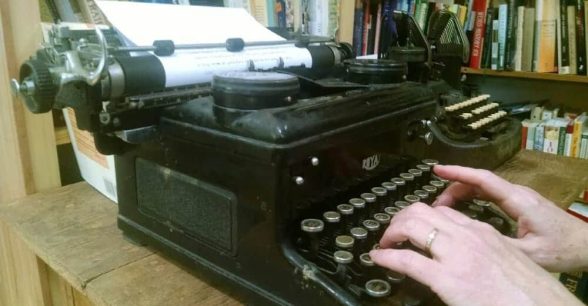It’s Time to Stop Desexualizing Disabled People
When I told my hearing ex-boyfriend that I was considering cochlear implant surgery, we were in bed in his college dorm room: an unwashed clearing in a muddle of strewn clothes, textbooks, and papers.
As a deaf 19-year-old undergraduate woman who wore hearing aids, I struggled to assimilate into hearing college culture. Young adults with no experience interacting with D/deaf people surrounded me 24/7, often in the frenzied settings that typify college life: frat parties rife with cloyingly sweet “jungle juice” in red Dixie cups; bustling bars cluttered by a commotion of strobe lights, thundering music, and underage students; hazily lit streets. Except for my ex-boyfriend, most of them seemed too caught up in playing beer pong and savoring their new freedom to learn to communicate with me. I thought a cochlear implant could help me fit in better.
But he was more concerned about how I would look.
“You’ll have a bump on your head,” he whined, grimacing, touching the skin behind my ear, as if to shield it from surgery. “Don’t get it. I’d be afraid to touch your head.”
Almost as soon as I had brought it up, I abandoned the subject. At the time, I couldn’t properly articulate the shame his words triggered, but now, from over a decade’s distance, I see clearly that, instead of encouraging me to consider the implications of modifying my body to assimilate into hearing culture, he had desexualized my deaf body. A cochlear implant—which consists of an electronic device surgically inserted beneath the skin and an external part that sits behind the ear—did not fit into his concept of beauty. In his mind, I could not have a cochlear implant and be sexually attractive at the same time.
It’s time to put a stop to damaging stereotypes about D/deaf and disabled people, who are widely regarded as asexual or sexually undesirable. As long as they’re perpetuated, D/deaf and disabled people will continue to be deprived of healthy sex lives, which, beyond reproducing, include opportunities for intimacy and pleasure. Losing out on a sex life can mean losing out on the numerous health benefits of sex, including reduced risk of heart disease, enhanced self-esteem, powerful bonding experiences, among others. (Of course, asexual disabled people exist, as Alaina Leary explains in her Rooted in Rights post here, and this legitimate, non-distressing, and non-pathological sexual orientation is not the same as being desexualized by nondisabled people.)
The pendulum can also swing too far into the other direction, into “devoteeism,” or the fetish for disabled bodies, which can deprive D/deaf and disabled people from meaningful and healthy sex lives and relationships, too. Jillian Weise, a disability activist, performance artist, and poet who has a bionic leg, is no stranger to fetishists. As she explained in an interview with Electric Literature, her first book, a poetry collection titled The Amputee’s Guide to Sex, “elicited amputee devotees, fetishists, and stalkers,” which forced her to “reconsider poetry” and “go to fiction for protection.” (In a piece for Granta, she describes being nervous about taking off her leg at night. “I wait until the last moment before sleep to un-tech because I am a woman who lives alone and has been stalked, so I don’t feel safe in my home on crutches. How would I run? How would I fight back?”) As a result, Jillian’s latest work aims to re-center the experiences of disabled people and either silence or satirize marginalizing rhetoric. These include her performative work as “Tipsy Tullivan,” her novel The Colony, her second poetry book The Book of Goodbyes, and most recently, her third poetry book, Cyborg Detective, published earlier this month.
Weise’s identification as a cyborg—as opposed to as a “tryborg who writes about or with machines while stuck in the ontological position of pure human,” as she explained in a recent Poets & Writers interview—strike me as a particularly powerful contribution to the argument against desexualizing and hypersexualizing disabled people. In a manifesto of sorts for Granta, she argues that there is nothing uncommon about cyborgs, or disabled people using assistive technology to navigate their everyday lives—whether they use a bionic limb, a cochlear implant, or an electric wheelchair, etc.—yet nondisabled people have erased their existence from the conversation about posthuman life. Weise implies that being a cyborg, although it is “common,” is a cause for celebration and reassertion of disabled identity: you’re the vision that the nondisabled dreamed up but refuse to see is already here. “Our lives are not metaphors,” she writes. In this way, disabled people express sexuality and beauty in a way that nondisabled people cannot access as mere tryborgs, or “pure humans.”
Through Weise’s lens, I see the scene with my ex-boyfriend anew: he was writing a false narrative about my sexuality, because he could not access my beauty and strengths as a deaf woman, which outsize his own. I use hearing aids and with the touch of a lever on my purple and pink Phonak Naida Vs, adjust my hearing to be louder or softer; he cannot. With a tap of a button, I home in on one voice in a sea of voices; he cannot. With a microphone wirelessly connected to my hearing aids, my hearing travels walls. Tryborgs like my ex-boyfriend can have their Apple AirPods—I’ve been streaming music directly and cordlessly into my ears since I got my first MP3 player in the early 2000s. For that matter, why confine technology to that which is purely mechanical? I communicate with other deaf people from a great distance through lip reading, signing, and Cued Speech. From Stephen Hawking’s discoveries about the universe, to the inventions of electric light, typewriters, audiobooks, speech-to-text technology, and texting technology on mobile phones, D/deaf and disabled people like us are the true life-hackers—and dare I say it, sexy, when truly, fully looked at.
With disabled people experiencing sexual assault at three times the rate of nondisabled people, it’s a mystery that, in the national conversation about sexual harassment and assault, nondisabled people aren’t talking more about the sexual health of D/deaf and disabled people. But by pointing out the conceptual frameworks that desexualize or hypersexualize us and recontextualizing them, D/deaf and disabled artists, writers, and activists like Weise are redirecting the conversation about the sexual health of D/deaf and disabled people in productive ways.
About Rooted In Rights
Rooted in Rights exists to amplify the perspectives of the disability community. Blog posts and storyteller videos that we publish and content we re-share on social media do not necessarily reflect the opinions or values of Rooted in Rights nor indicate an endorsement of a program or service by Rooted in Rights. We respect and aim to reflect the diversity of opinions and experiences of the disability community. Rooted in Rights seeks to highlight discussions, not direct them. Learn more about Rooted In Rights



